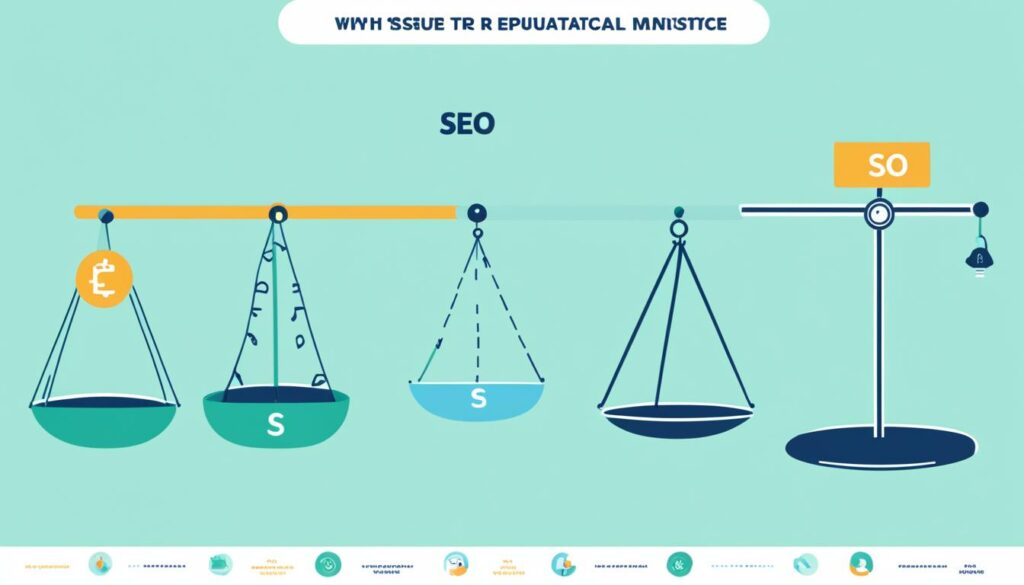Can a business’s online reputation make or break its SEO efforts? Yes, definitely. Today, in the digital world, online reviews and feedback are key. They shape how people see a brand. This means that managing your reputation well is more vital than ever for SEO1.
Long gone are the days of just using lots of keywords to rank high. Now, it’s about creating content that is useful, engaging, and shows off your expertise. This boosts your chances of appearing in search results. Reviews left by users are also a big deal now. Each one acts like fresh content that can help your site rank better1.
The stars a business gets are important for how it shows up in searches. These stars directly affect a company’s ranking in search results1. To keep a good rating, you need a lot of positive reviews. This is where online reputation management (ORM) shines. It’s key in any digital marketing plan aimed at improving SEO1.
A good ORM strategy focuses on getting more reviews. That leads to better star ratings and more people engaging with your brand1. Managing your reputation on Google is especially crucial. It affects your online footprint and how people perceive your business1. Putting reviews on location pages can even boost your ranking. That’s because it makes the reviews more visible to search engines1.
Though strategies like content marketing are still crucial, combining them with ORM is key for the best results. ORM platforms that are thorough are vital for strong Google reputation management. They help you effectively use consumer reviews1. Understanding and using the link between reputation management and SEO can keep your business ahead. It helps you have a powerful online presence that stands out in the digital world1.
Key Takeaways
- Online reputation management significantly impacts SEO rankings and overall online presence1.
- 90% of consumers avoid businesses with a bad reputation2,3.
- User-generated reviews are considered new, relevant content and influence search rankings1.
- Businesses risk losing up to 70% of potential customers with four or more negative articles on the first page of Google2.
- Integrating ORM strategies with traditional SEO practices leads to better search rankings and a stronger online presence1.
The Importance of Online Reputation for SEO Success
In the digital era, online reviews heavily influence what we buy. Almost everyone (98%) looks at reviews before buying, and 77% do it a lot4. By 2023, over 2.64 billion people will be buying online, showing how big the online market is.
Having a bad online image can hurt a business a lot. 82% of people avoid things with bad reviews4. And most won’t even bother with something rated under 3.3 stars4. A single bad review can turn people away from what you offer4.
Online reviews do more than just impact buying decisions. They also affect where companies show up in search results. Reviews are seen as fresh content, which search engines like and reward with better rankings1.
Google also looks at the amount of content a company and its users put out. The more content, the better the rank. Plus, reviews help a business be found in more searches1.
To use reviews well for SEO, businesses should work on their online image. They need to ask customers for reviews and reply to bad ones nicely. Good reviews help a lot with trust and getting more people to find you online.
But, it’s key to be honest and avoid tricks like using too many keywords. Google will drop your ranking if it catches you doing this1. Instead, focus on real feedback and quality content. Using an ORM platform can help you get more reviews on popular sites1.
Online reputation management is crucial for all types and sizes of businesses, influencing customer trust, decision-making, and overall business success4.
Now, sites with great reviews get better search spots1. Combining good online image management with SEO helps businesses do well in today’s market. It’s about building trust with your audience.
| ORM Strategy | SEO Benefits |
|---|---|
| Encourage customer reviews | Boosts SERP ranking and improves locations’ rankings |
| Respond to negative reviews | Builds trust and can turn dissatisfied customers into loyal ones |
| Leverage positive reviews | Enhances brand credibility and attracts organic search traffic |
| Distribute reviews across major sites | Improves search engine visibility and ranking |
Focusing on your online reputation helps you succeed in digital marketing. It strengthens your brand and leads to long-lasting success.
Best Practices for Building a Positive Online Reputation
Taking charge of your online image is key for small and local businesses. It’s crucial for reaching your goals. Pushing the right content and lessening negative reviews helps you shine online. This trust benefits you greatly, especially since most customers steer clear of bad reviews. With billions of digital buyers out there, your reputation is everything for more sales and a wider customer base.

Start by checking how you look online. An in-depth look lets you spot trouble early, cutting the risk of big issues. It also shows you how people see your brand. This view helps you make your products and services better.
Make friends in the media world. This includes using different platforms to share good news about your brand. It also means using ads, SEM, and social media to show your brand in a good light.
Connecting with the media is more important now than ever. This helps more people know about you. And it can turn them into fans by making them excited about what you offer. Working with influencers can also spread the word to more folks.
Don’t forget about search engines. They can make or break your reputation. By guarding against bad stories online, you stay on top for what matters to you. Since people mostly click the first link on Google, where you rank matters a lot.
Happy customers are your best allies. Google thinks so, too. Their good words can boost you in search results and make more people check you out. Plus, it makes you look more trustworthy. Always reply to what customers say, good or bad, to show you care. This boosts loyalty and trust.
“A study by Moz revealed that one negative content piece could lead to a 21.9% loss of potential customers for a business, escalating to a potential 70% loss with four or more negative articles, emphasizing the impact of negative online reputation on profitability.”5
To make the most of your online spot:
- Be active in forums for more visitors and links6
- Write for big sites to get seen more and build trust65
- Claim your space on Google and social media. They often come up first in searches5
- Check what people say about you and join in on social media to boost your rep7
- Use tools to make managing your online image easier6
| Proactive Reputation Management | Reactive Reputation Management |
|---|---|
| Saves energy, effort, and money for new businesses6 | Reduces the impact of negative reviews6 |
| Prepares a crisis communication plan6 | Addresses negative content and reviews |
| Focuses on creating positive content and press coverage | Employs SEO strategies to improve online presence7 |
Staying smart and steady is the way to win at online reputation management. Using these methods and keeping a positive face online helps protect your image. It also wins trust and success for your business.
Integrating SEO and Reputation Management Strategies
Combining SEO and reputation management is key today. It helps businesses keep their online presence strong and draw in visitors. Good content is vital for SEO. Yet, reviews made by users have also become key. They add fresh, relevant content that search engines like. Recent studies show over 84% of people check online reviews before choosing a business3.

Google pays attention to both what companies and people say about a business. It also looks at how accurate a business’s online profile is. This shows how crucial it is to manage your online reputation well. Studies have found a clear link between a business’s good online image and showing up at the top of search results8. Businesses that rank high attract more visitors. This tells search engines that the business is popular among customers7.
Having lots of positive reviews is important for a good online image. This is why online reputation management (ORM) is now critical in digital marketing. Ignoring ORM in your SEO plan can mean it won’t work as well. A solid SEO strategy today should focus on ORM alongside these key points:
- Having a plan to get more reviews, which can boost your rating
- Keeping an eye on reviews across Google, Facebook, and other major sites
- Sharing reviews on your site to help with local search rankings
Even though things like creating great content are still necessary, they’re not enough by themselves. Without a good online image, your business won’t get noticed in Google’s local 3-pack. A big example of this is United Airlines. Bad online press caused their stock to drop and upset customers7.
| SEO Strategy | Reputation Management Strategy | Benefits |
|---|---|---|
| Keyword-rich content | Monitoring online reviews | Improved search rankings and brand perception |
| Link building | Answering customer reviews | More website visits and customer trust |
| Optimizing pages | Getting good reviews | More clicks and sales |
Managing your Google reputation well means using a tool that can handle all your reviews. This way, you can solve issues mentioned in bad reviews. This makes customers happier and improves how others see you online7. Answering reviews, both the good and the bad, shows that you care. It’s a sign that you listen to your customers, which helps your online image7.
For businesses to do well online, SEO and online reputation management must go hand in hand. With 90% of people steering clear of businesses with a bad online rep3, a solid SEO-ORM strategy is a must. Following the best practices in these areas can lead to success. It helps increase your brand’s visibility and creates a positive image that your audience will appreciate.
SEO and Reputation Management: A Synergistic Relationship
SEO is not the same thing as Online Reputation Management (ORM). SEO focuses on making your website more visible in search results. It includes things like looking for the right keywords, improving your site’s content, and getting more links. On the other hand, ORM is about controlling how people view your brand online. It deals with tactics like keeping an eye on what’s being said about you, getting good reviews, and handling bad ones9.
Even though SEO and ORM are different, they help each other make your brand look good online. Good online reviews can draw more people to your site. For example, a search result with high praises might get more clicks, like a 5-star restaurant attracting more diners. Websites with good reviews usually see more clicks than those with bad reviews, highlighting the importance of managing what people say about you online10.

At the heart of the matter is SEOLeverage, a group of SEO specialists. They help bridge the gap between SEO and ORM. SEOLeverage offers services that boost both your SEO game and protect your brand’s image. These services are key for any business wanting to look good online11.
ORM has become a must today. A study by Trustpilot shows 90% of people would avoid a company with a poor online image. What’s online about you really does matter. Most consumers look at reviews to judge a company’s quality. This shows that keeping a good online reputation is vital for winning customers over10.
How you show up in searches can totally shape what people think. Google looks at the reviews and feedback about a business. Good online words really do get you noticed more. This is why managing how people see you online can boost your visibility. Firms that work on their online image often get noticed more online, proving the power of reputation management11.
You can’t control what everyone says about you. But using SEO and ORM can help you have a say in your search results. This means you can play down the bad stuff and highlight the good. Doing some smart keyword research can make your brand seem better. It can help change how people view your business online and increase trust with future customers11. Responding to reviews, both good and bad, matters a lot. It keeps your online reputation positive and shows you care about your customers’ feedback9.
Conclusion
To manage our online reputation well, it’s key to boost the good stuff online and reduce the bad12. This means not just improving our own websites but also using good news and media mentions to get noticed more12. When we share positive articles on our social media and website, more people see them. This boosts the good stuff and pushes down the bad in search results12.
Keep in mind, keeping a good online rep is an always job. We need to always check and tweak things to keep up with how search engines work12. And sometimes, it’s best to get help from pros, especially if there’s a lot of bad info about us online. Getting advice from an SEO and ORM expert can be a smart move12. They can look at our online info, make a plan that’s right for us, and help us take control of our online story.
For those keen on boosting their SEO and reputation management, SEOLeverage is a top choice. They use data and strategies that work to help businesses shine online. SEOLeverage combines SEO and ORM to stand out in the crowded digital market, positively positioning our brand.
FAQ
How does online reputation management impact SEO?
What are some best practices for managing online reputation?
How can I encourage positive reviews for my business?
What role does content play in online reputation management?
How can I handle negative reviews or online mentions?
What is the relationship between SEO and online reputation management?
How can I monitor my online reputation effectively?
What should I do if I face a reputation crisis online?
Source Links
- https://reputation.com/resources/articles/how-online-reputation-management-is-redefining-seo-and-what-to-do-about-it/
- https://statuslabs.com/blog/seo-reputation-management
- https://seoleverage.com/seo-tips/the-importance-of-seo-for-reputation-management/
- https://sachsmarketinggroup.com/why-online-reputation-management-is-important/
- https://get.nicejob.com/resources/seo-reputation-management
- https://www.blueoceanglobaltech.com/blog/online-reputation-management-best-practices/
- https://www.semrush.com/local/blog/seo-reputation-management/
- https://jdmwebtechnologies.com/blog/connection-between-seo-and-orm/
- https://organixmedia.com/seo/strategies/reputation-management/
- https://medium.com/@abdullahbinzahid04/the-role-of-reputation-management-in-seo-6c0a750f8d81
- https://www.jdmwebtechnologies.com/blog/connection-between-seo-and-orm/
- https://blog.reputationx.com/seo-in-orm

